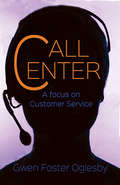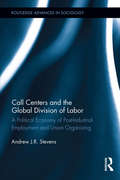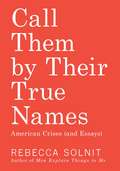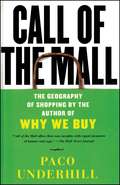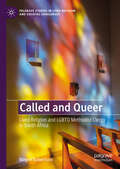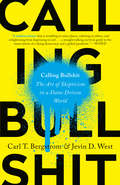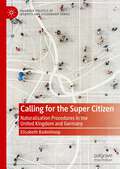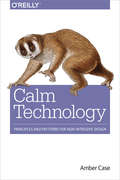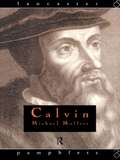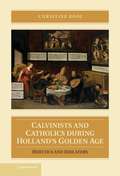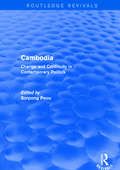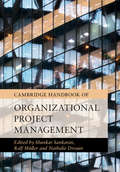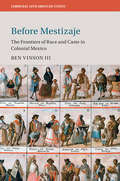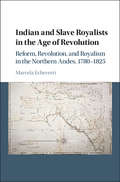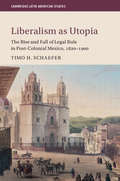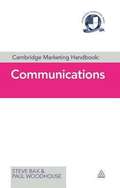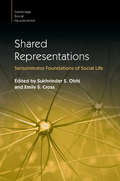- Table View
- List View
Call Center: A Focus on Customer Service
by Gwen Foster OglesbyA customer service expert offers practical strategies for call center managers who want to inspire their employees to be there best.Gwendolyn Oglesby has built her entire career working in customer service, creating environments and experiences that are as positive for employees as they are for customers. Now Oglesby shares the tools and strategies she has developed for improving customer service skills, managing employees, and building a successful team culture.In Call Center, Oglesby teaches managers how to train, motivate, and encourage employees to reach their full potential. Each chapter features insightful personality profiles and thought-provoking questions about call center dynamics. At the end of the day, customer service is not just about serving the customer; it’s about serving your team as well.
Call Centers and the Global Division of Labor: A Political Economy of Post-Industrial Employment and Union Organizing (Routledge Advances in Sociology #120)
by Andrew J.R. StevensCall centers have come, in the last three decades, to define the interaction between corporations, governments, and other institutions and their respective customers, citizens, and members. The offshoring and outsourcing of call center employment, part of the larger information technology and information-technology-enabled services sectors, continues to be a growing practice amongst governments and corporations in their attempts at controlling costs and providing new services. While incredible advances in technology have permitted the use of distant and "offshore" labor forces, the grander reshaping of an international political economy of communications has allowed for the acceleration of these processes. New and established labor unions have responded to these changes in the global regimes of work by seeking to organize call center workers. These efforts have been assisted by a range of forces, not least of which is the condition of work itself, but also attempts by global union federations to build a bridge between international unionism and local organizing campaigns in the Global South and Global North. Through an examination of trade union interventions in the call center industries located in Canada and India, this book contributes to research on post-industrial employment by using political economy as a juncture between development studies, the sociology of work, and labor studies.
Call Them by Their True Names: American Crises (and Essays)
by Rebecca SolnitThe work of changing the world sometimes requires changing the story, the names, and inventing or popularizing new names and terms and phrases. Calling things by their true names can also cut through the lies that excuse, disguise, avoid, or encourage inaction, indifference, obliviousness in the face of injustice and violence.
Call of the Mall: The Author of Why We Buy on the Geography of Shopping
by Paco UnderhillThe author of the international bestseller Why We Buy—praised by The New York Times as “a book that gives this underrated skill the respect it deserves”—now takes us to the mall, a place every American has experienced and has an opinion about.Paco Underhill, the Margaret Mead of shopping and author of the huge international bestseller Why We Buy, now takes us to the mall, a place every American has experienced and has an opinion about. The result is a bright, ironic, funny, and shrewd portrait of the mall—America’s gift to personal consumption, its most powerful icon of global commercial muscle, the once new and now aging national town square, the place where we convene in our leisure time. It’s about the shopping mall as an exemplar of our commercial and social culture, the place where our young people have their first taste of social freedom and where the rest of us compare notes. Call of the Mall examines how we use the mall, what it means, why it works when it does, and why it sometimes doesn’t.
Called and Queer: Lived religion and LGBTQ Methodist Clergy in South Africa (Palgrave Studies in Lived Religion and Societal Challenges)
by Megan RobertsonThis book is the first in-depth study of the lived experiences of queer Christian clergy in an African context. Using a queer lived religion framing, it draws on ethnographic research to analyse how six LGBTQ clergy understand and practice their vocation in the Methodist Church of Southern Africa (MCSA). Seemingly marginalised in a denomination which maintains that marriage is only between one man and one woman, this book explores why LGBTQ clergy are motivated to live out their calling in the Church and how they make sense of their positions within it. In doing so, it looks beyond an analysis of a Church based on its official and doctrinal institutional positions on queer people and sexualities and, instead, uncovers the taken-for-granted ways that gender and sex are inscribed in ‘the way we do things around here’. This book is relevant to students and researchers in gender and sexuality studies, African religious studies, and sociology of religion.
Calling Bullshit: The Art of Skepticism in a Data-Driven World
by Carl T. Bergstrom Jevin D. WestBullshit isn&’t what it used to be. Now, two science professors give us the tools to dismantle misinformation and think clearly in a world of fake news and bad data. Misinformation, disinformation, and fake news abound and it&’s increasingly difficult to know what&’s true. Our media environment has become hyperpartisan. Science is conducted by press release. Startup culture elevates bullshit to high art. We are fairly well equipped to spot the sort of old-school bullshit that is based in fancy rhetoric and weasel words, but most of us don&’t feel qualified to challenge the avalanche of new-school bullshit presented in the language of math, science, or statistics. In Calling Bullshit, Professors Carl Bergstrom and Jevin West give us a set of powerful tools to cut through the most intimidating data. You don&’t need a lot of technical expertise to call out problems with data. Are the numbers or results too good or too dramatic to be true? Is the claim comparing like with like? Is it confirming your personal bias? Drawing on a deep well of expertise in statistics and computational biology, Bergstrom and West exuberantly unpack examples of selection bias and muddled data visualization, distinguish between correlation and causation, and examine the susceptibility of science to modern bullshit. We have always needed people who call bullshit when necessary, whether within a circle of friends, a community of scholars, or the citizenry of a nation. Now that bullshit has evolved, we need to relearn the art of skepticism.
Calling for the Super Citizen: Naturalisation Procedures in the United Kingdom and Germany (Palgrave Politics of Identity and Citizenship Series)
by Elisabeth BadenhoopThis book offers the first empirical and holistic analysis of the design, implementation and effects of the new naturalisation regimes in the United Kingdom and Germany introduced in the 2000s. Based on a multi-sited state ethnography, it uniquely compares the law on the books, the local administration, and the lived experiences of citizenship tests, courses, and ceremonies from an interdisciplinary social science perspective.The book argues that naturalisation procedures in both countries suggest to migrants to constantly optimise themselves in the state’s interests toward the subjectivity of the “Super Citizen” – a political, economic, and cultural asset to the liberal-democratic, capitalist nation-state. The concept of the Super Citizen enables us to highlight and criticise the overburdening expectations toward citizens by application as opposed to citizens by birth. The analysis reveals that the self-presentation of Britain and Germany as liberal and meritocratic polities is in stark contrast to migrants’ lived experiences of the naturalisation process.By shedding light on naturalisation policies’ efficacy, this book is aimed at students and scholars in sociology, politics, law, anthropology, and education, as well as policy-makers in the areas of citizenship and migration.
Calm Technology: Principles and Patterns for Non-Intrusive Design
by Amber CaseHow can you design technology that becomes a part of a user’s life and not a distraction from it? This practical book explores the concept of calm technology, a method for smoothly capturing a user’s attention only when necessary, while calmly remaining in the background most of the time. You’ll learn how to design products that work well, launch well, are easy to support, easy to use, and remain unobtrusive.Author Amber Case presents ideas first introduced by researchers at Xerox PARC in 1995, and explains how they apply to our current technology landscape, especially the Internet of Things. This book is ideal for UX and product designers, managers, creative directors, and developers. You’ll learn:The importance and challenge of designing technology that respects our attentionPrinciples of calm design—peripheral attention, context, and ambient awarenessCalm communication patterns—improving attention through a variety of sensesExercises for improving existing products through calm technologyPrinciples and patterns of calm technology for companies and teamsThe origins of calm technology at Xerox PARC
Calvin
by Michael MullettIn this lucid and readable study, Michael Mullet explains the historical importance of a man and a movement whose influence are still felt in the modern world. The pamphlet locates John Calvin in the context of early 16th-century France and then charts his emergence as an influential theologian and civic religious leader in the 'second generation' of reformers following Luther. After exploring the main lines of Calvin's theology, set out in the Institutes, the central section deals with the difficult process by which his authority was imposed on, or accepted by, Geneva. Finally, the long-term impact of John Calvin is evaluated, including the hypothesis that Calvinism has assisted the economic development of Europe.
Calvinists and Catholics during Holland's Golden Age
by Christine KooiThis book examines the social, political, and religious relationships between Calvinists and Catholics during Holland's Golden Age. Although Holland, the largest province of the Dutch Republic, was officially Calvinist, its population was one of the most religiously heterogeneous in early modern Europe. The Catholic Church was officially disestablished in the 1570s, yet by the 1620s Catholicism underwent a revival, flourishing in a semi-clandestine private sphere. The book focuses on how Reformed Protestants dealt with this revived Catholicism, arguing that confessional coexistence between Calvinists and Catholics operated within a number of contiguous and overlapping social, political, and cultural spaces. The result was a paradox: a society that was at once Calvinist and pluralist. Christine Kooi maps the daily interactions between people of different faiths and examines how religious boundaries were negotiated during an era of tumultuous religious change.
Cambodia: Change and Continuity in Contemporary Politics (Working Papers Ser.)
by Sorpong PeouThis title was first published in 2001. This text offers a comprehensive view of controversial issues surrounding Cambodia's past, present and possible future development. It brings together a selection of journal articles about the wartorn country to examine critical issues concerning change and continuity in contemporary Cambodian politics. The book covers violence, war and peace, the Constitution, human rights and the pursuit of justice, democratic development and dilemmas, gender and ethnic relations and economic development and problems. These themes should be instructive for scholars, policymakers and interested individuals dealing with what has been termed "triple transition": from armed conflict to the end of violent hostility, from political authoritarianism to liberal democracy and from socialist economic systems to market-driven or capitalist ones. The book shows that the trajectory towards peace, democracy and sustainable development is complex, full of dangers and in need of careful management.
Cambridge Approaches to Language Contact: The Making of Vernacular Singapore English
by Zhiming BaoSingapore English is a focal point across the many subfields of linguistics, as its semantic, syntactic and phonetic/phonological qualities tell us a great deal about what happens when very different types of language come together. Sociolinguists are also interested in the relative status of Singapore English compared to other languages in the country. This book charts the history of Singapore English and explores the linguistic, historical and social factors that have influenced the variety as it is spoken today. It identifies novel grammatical features of the language, discusses their structure and function, and traces their origins to the local languages of Singapore. It places grammatical system and usage at the core of analysis, and shows that introspective and corpus data are complementary. This study will be of interest to scholars and advanced students working on language contact, world varieties of English, historical linguistics and sociolinguistics.
Cambridge Companions to Management: Mindfulness in Organizations:
by Jochen RebMindfulness techniques, having long played an important role in contemplative traditions around the world, are now recognized as having the potential to transform workplaces. As interest in the role of mindfulness in organizational settings continues to increase, this timely book fills a gap in the literature by providing an overview of the latest theoretical and empirical research on workplace mindfulness. It brings together world-leading scholars to explore the foundations, key discussions, diversity of approaches and applications of mindfulness in organizations. It acts as a catalyst for future research on the topic by suggesting research directions and stimulating organizational researchers to embark on new projects involving mindfulness. Furthermore, it provides valuable ideas for implementing mindfulness programs in organizations, for teaching mindfulness in business contexts, and for coaching with mindfulness. This must-read book will appeal to researchers and professionals in the fields of organizational behavior, organizational psychology and employee well-being.
Cambridge Companions to Management: Organizational Wrongdoing
by Donald Palmer Palmer, Donald and Smith-Crowe, Kristin and Greenwood, Royston Kristin Smith-Crowe Royston GreenwoodOrganizational Wrongdoing is an essential companion to understanding the causes, processes and consequences of misconduct at work. With contributions from some of the world's leading management theorists, past theories on misconduct are critically evaluated, and the latest research is introduced, expanding the boundaries of our knowledge and filling in gaps highlighted in previous studies. A wide range of unethical, socially irresponsible, and illegal behaviors are discussed, including cheating, hyper-competitive employee actions, and financial fraud. Further multiple levels of analysis are considered, ranging from individual to organization-wide processes. By providing a contemporary overview of wrongdoing and misconduct, this book provides solid and accessible foundations for established researchers and advanced students in the fields of behavioral ethics and organizational behavior.
Cambridge Companions to Religion: The Cambridge Companion to Christian Political Theology
by Craig HoveyInterest in political theology has surged in recent years, and this accessible volume provides a focused overview of the field. Many are asking serious questions about religious faith in secular societies, the origin and function of democratic polities, worldwide economic challenges, the shift of Christianity's center of gravity to the global south, and anxieties related to bold and even violent assertions of theologically determined political ideas. In fourteen original essays, authors examine Christian political theology in order to clarify the contemporary discourse and some of its most important themes and issues. These include up-to-date, critical engagements with historical figures like Augustine, Thomas Aquinas, and Immanuel Kant; discussions of how the Bible functions theopolitically; and introductions to key movements such as liberation theology, Catholic social teaching, and radical orthodoxy. An invaluable resource for students and scholars in theology, the Companion will also be beneficial to those in history, philosophy, and politics.
Cambridge Handbook of Culture, Organizations, and Work
by Richard M. Steers Rabi S. BhagatIt is now widely recognized that countries around the world are becoming increasingly interconnected, and that both public and private organizations are of necessity becoming increasingly global. As political, legal, and economic barriers recede in this environment, cultural barriers emerge as a principal challenge to organizational survival and success. It is not yet clear whether these global realities will cause cultures to converge, harmonize, and seek common ground or to retrench, resist, and accentuate their differences. In either case, it is of paramount importance for both managers and organizational scholars to understand the cultural crosscurrents underlying these changes. With contributions from an international team of scholars, this 2009 book reviews, analyzes, and integrates available theory and research to give the best information possible concerning the role of culture and cultural differences in organizational dynamics.
Cambridge Handbook of Organizational Project Management
by Ralf Müller Shankar Sankaran Nathalie DrouinIn recent years, organizational project management (OPM) has emerged as a field focused on how project, program and portfolio management practices strategically help firms realize organizational goals. There is a compelling need to address the totality of project-related work at the organizational level, providing a view of organizations as a network of projects to be coordinated among themselves, integrated by the more permanent organization, and to move away from a focus on individual projects. This comprehensive volume provides views from a wide range of international scholars researching OPM at a cross-disciplinary level. It covers concepts, theories and practices from disciplines allied to management, such as strategic management, organization sciences and behavioural science. It will be a valuable read for scholars and practitioners alike, who are looking to enrich their understanding of OPM and further investigate this new phenomenon.
Cambridge Latin American Studies: Before Mestizaje
by Ben Vinson IIIThis book opens new dimensions on race in Latin America by examining the extreme caste groups of colonial Mexico. In tracing their experiences, a broader understanding of the connection between mestizaje (Latin America's modern ideology of racial mixture) and the colonial caste system is rendered. Before mestizaje emerged as a primary concept in Latin America, an earlier precursor existed that must be taken seriously. This colonial form of racial hybridity, encased in an elastic caste system, allowed some people to live through multiple racial lives. Hence, the great fusion of races that swept Latin America and defined its modernity, carries an important corollary. Mestizaje, when viewed at its roots, is not just about mixture, but also about dissecting and reconnecting lives. Such experiences may have carved a special ability for some Latin American populations to reach across racial groups to relate with and understand multiple racial perspectives. This overlooked, deep history of mestizaje is a legacy that can be built upon in modern times.
Cambridge Latin American Studies: Indian and Slave Royalists in the Age of Revolution
by Marcela EcheverriRoyalist Indians and slaves in the northern Andes engaged with the ideas of the Age of Revolution (1780-1825), such as citizenship and freedom. Although generally ignored in recent revolution-centered versions of the Latin American independence processes, their story is an essential part of the history of the period. In Indian and Slave Royalists in the Age of Revolution, Marcela Echeverri draws a picture of the royalist region of Popay#65533;n (modern-day Colombia) that reveals deep chronological layers and multiple social and spatial textures. She uses royalism as a lens to rethink the temporal, spatial, and conceptual boundaries that conventionally structure historical narratives about the Age of Revolution. Looking at royalism and liberal reform in the northern Andes, she suggests that profound changes took place within the royalist territories. These emerged as a result of the negotiation of the rights of local people, Indians and slaves, with the changing monarchical regime.
Cambridge Latin American Studies: Indigenous Elites and Creole Identity in Colonial Mexico, 1500–1800
by Villella Peter B.Modern Mexico derives many of its richest symbols of national heritage and identity from the Aztec legacy, even as it remains a predominantly Spanish-speaking, Christian society. This volume argues that the composite, neo-Aztec flavor of Mexican identity was, in part, a consequence of active efforts by indigenous elites after the Spanish conquest to grandfather ancestral rights into the colonial era. By emphasizing the antiquity of their claims before Spanish officials, native leaders extended the historical awareness of the colonial regime into the pre-Hispanic past, and therefore also the themes, emotional contours, and beginning points of what we today understand as 'Mexican history'. This emphasis on ancient roots, moreover, resonated with the patriotic longings of many creoles, descendants of Spaniards born in Mexico. Alienated by Spanish scorn, creoles associated with indigenous elites and studied their histories, thereby reinventing themselves as Mexico's new 'native' leadership and the heirs to its prestigious antiquity.
Cambridge Latin American Studies: The Rise and Fall of Legal Rule in Post-Colonial Mexico, 1820–1900 (Cambridge Latin American Studies #106)
by Schaefer Timo H.Liberalism as Utopia challenges widespread perceptions about the weakness of Mexico's nineteenth-century state. Schaefer argues that after the War of Independence non-elite Mexicans - peasants, day laborers, artisans, local merchants - pioneered an egalitarian form of legal rule by serving in the town governments and civic militias that became the local faces of the state's coercive authority. These institutions were effective because they embodied patriarchal norms of labor and care for the family that were premised on the legal equality of male, adult citizens. The book also examines the emergence of new, illiberal norms that challenged and at the end of the century, during the dictatorship of Porfirio Daz, overwhelmed the egalitarianism of the early-republican period. By comparing the legal cultures of agricultural estates, mestizo towns and indigenous towns, Liberalism as Utopia also proposes a new way of understanding the social foundations of liberal and authoritarian pathways to state formation in the nineteenth-century world.
Cambridge Marketing Handbook: Communications
by Paul Woodhouse Steve BaxCambridge Marketing Handbook: Marketing Communications looks at the contemporary integrated communications mix, in the light of the changes in digital marketing and aims to give an overview of the current tools that marketers need to have under their belts. Coverage includes: the purpose and uses of communications; the promotional mix; advertising tools; public relations and media tools; the meaning of consumer behaviour; communications plans and evaluation methods. The Handbook also examines the buyer behaviour theories for B2C and B2C, looking at the elements that make up the process of purchase.
Cambridge Military Histories: Morale and the Italian Army during the First World War
by Vanda WilcoxItalian performance in the First World War has been generally disparaged or ignored compared to that of the armies on the Western Front, and troop morale in particular has been seen as a major weakness of the Italian army. In this first book-length study of Italian morale in any language, Vanda Wilcox reassesses Italian policy and performance from the perspective both of the army as an institution and of the ordinary soldiers who found themselves fighting a brutally hard war. Wilcox analyses and contextualises Italy's notoriously hard military discipline along with leadership, training methods and logistics before considering the reactions of the troops and tracing the interactions between institutions and individuals. Restoring historical agency to soldiers often considered passive and indifferent, Wilcox illustrates how and why Italians complied, endured or resisted the army's demands through balancing their civilian and military identities.
Cambridge Social Neuroscience: Shared Representations
by Cross Obhi Sukhvinder S. Emily S.Socially situated thought and behaviour are pervasive and vitally important in human society. The social brain has become a focus of study for researchers in the neurosciences, psychology, biology and other areas of behavioural science, and it is becoming increasingly clear that social behaviour is heavily dependent on shared representations. Any social activity, from a simple conversation to a well-drilled military exercise to an exquisitely perfected dance routine, involves information sharing between the brains of those involved. This volume comprises a collection of cutting-edge essays centred on the idea of shared representations, broadly defined. Featuring contributions from established world leaders in their fields and written in a simultaneously accessible and detailed style, this is an invaluable resource for established researchers and those who are new to the field.
Cambridge Social and Cultural Histories: The Channel
by Renaud MorieuxRather than a natural frontier between natural enemies, this book approaches the English Channel as a shared space, which mediated the multiple relations between France and England in the long eighteenth century, in both a metaphorical and a material sense. Instead of arguing that Britain's insularity kept it spatially and intellectually segregated from the Continent, Renaud Morieux focuses on the Channel as a zone of contact. The 'narrow sea' was a shifting frontier between states and a space of exchange between populations. This richly textured history shows how the maritime border was imagined by cartographers and legal theorists, delimited by state administrators and transgressed by migrants. It approaches French and English fishermen, smugglers and merchants as transnational actors, whose everyday practices were entangled. The variation of scales of analysis enriches theoretical and empirical understandings of Anglo-French relations, and reassesses the question of Britain's deep historical connections with Europe.
